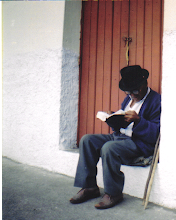The Pharisees and their followers were tragic characters. After centuries of captivity, the nation of Israel had dwindled in size and influence until it existed only by the grace of foreign powers. At the time of Christ, Rome ruled Judea and the remnant of Israel that had returned from ancient captivity. And the Pharisees waited for King Messiah to liberate them. But their focus on physical freedom caused them to "look beyond the mark" when He came. (Jacob 4:14).
This spiritual over-sightedness resulted from centuries of misinterpretation of their scriptures. The greatest scribes and lawyers had analyzed ancient prophesies and the Mosaic law, and with their own learning and wisdom, they established their interpretations as the law. And anyone who dared to challenge their interpretations was labeled a blasphemer and a heretic.
Thus, they exalted their interpretation of the scriptures over the Word.
In the fulness of times, "the Word was made flesh and dwelt among the [Jews and the Pharisees]." (John 1:14). And had they focused on the prophesies of the scriptures, the Pharisees and their followers would have recognized Jesus for who He was. Certainly, the Magi of the East were not the only ones who saw the new star which attested to the birth of the Messiah. But the Bible is silent as to whether anyone else followed it to the Christ child or was even looking for it. The Pharisees’ failure to recognize the signs of the birth of the Messiah caused them to miss one of the most wondrous nights in history.
And when Jesus’ ministry began, the Pharisees still failed to recognize the coming of their Redeemer. Here was the Son of the wife of a carpenter, a Nazarene. And throughout His ministry, He openly contradicted Pharisaic traditions. Instead of stirring insurrection to liberate Israel, He proclaimed peace. Rather than submitting to Pharisaic law, He taught the Higher Law of the Father. He healed on the Sabbath. And He had the audacity to teach that He was the I AM who gave the law, would fulfill it, and would give a new, higher law. Surely, this couldn’t be the promised Messiah.
This is the greatest tragedy of the Pharisees: Jesus was Jehovah incarnated, even the God whom the Pharisees claimed to worship, and they took their God, hated Him, rejected Him, persecuted Him, and crucified Him, all because Jesus didn’t fit within their messianic mold.
And like the prodigal son’s older brother, the gates to their Father’s house stood open, but they refused to enter because their rules weren’t being kept.

No comments:
Post a Comment